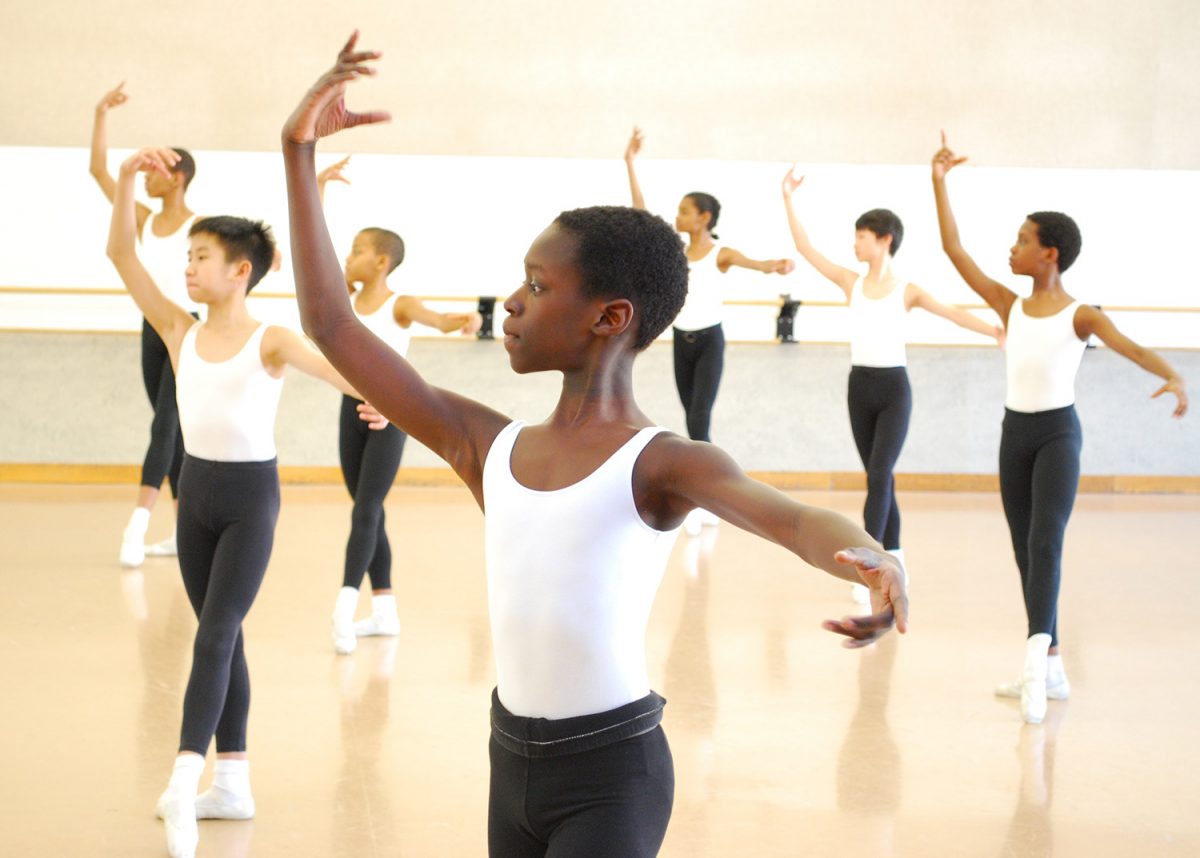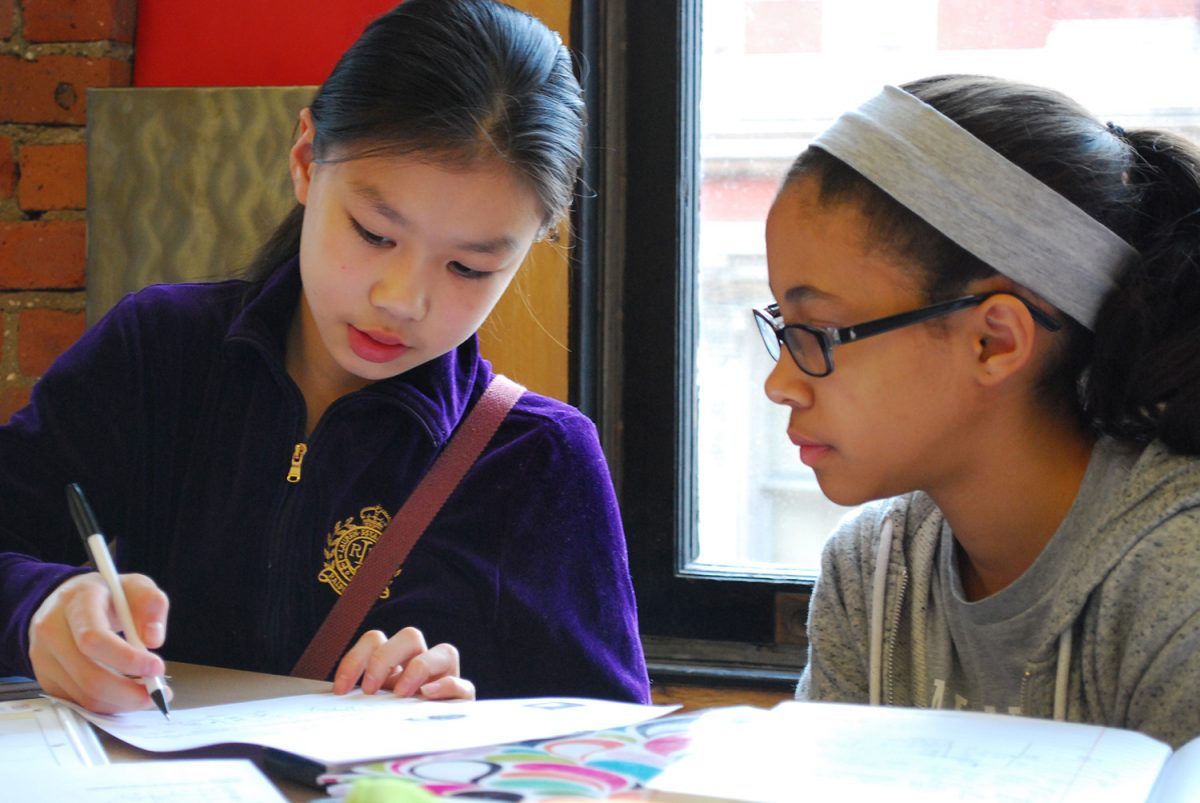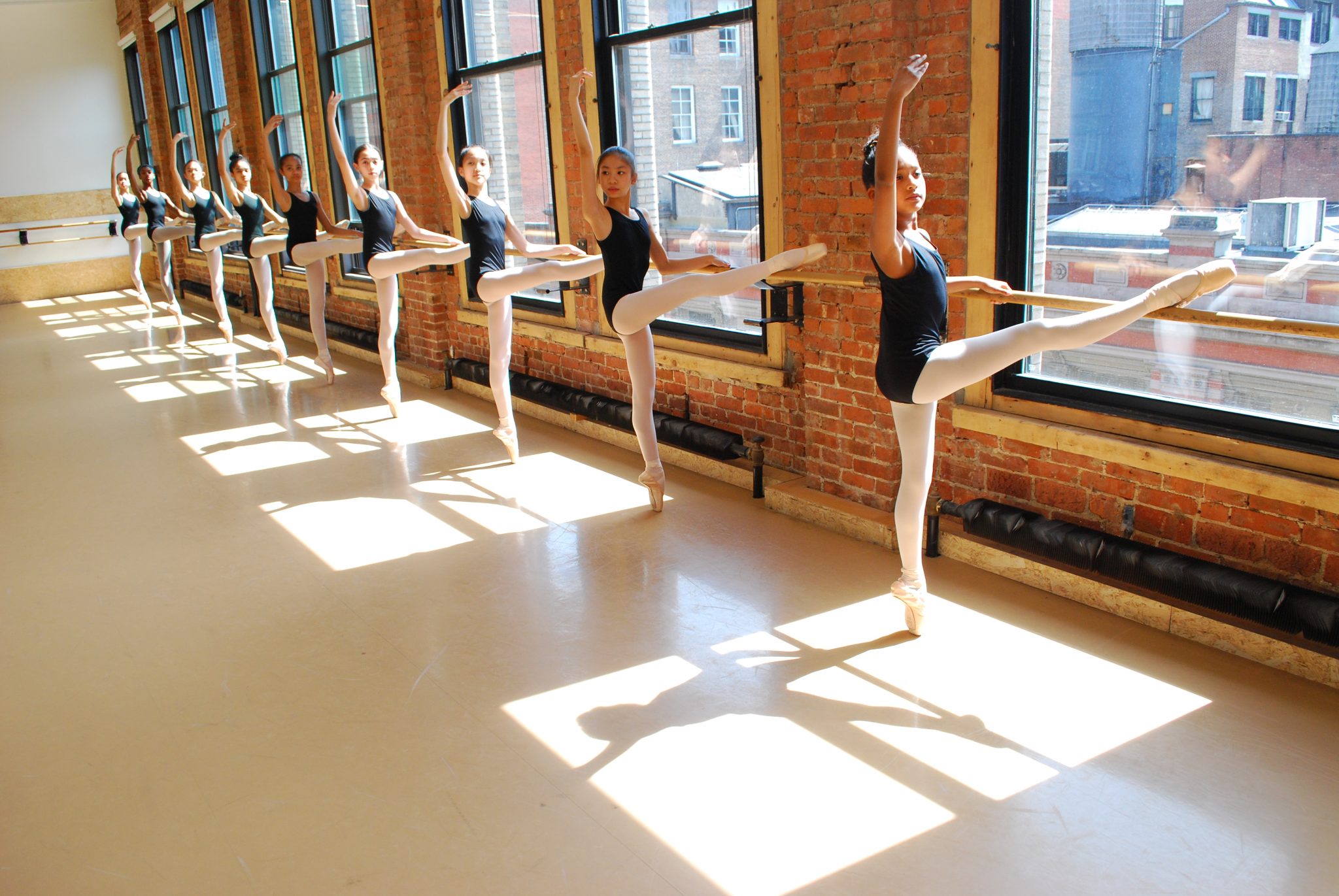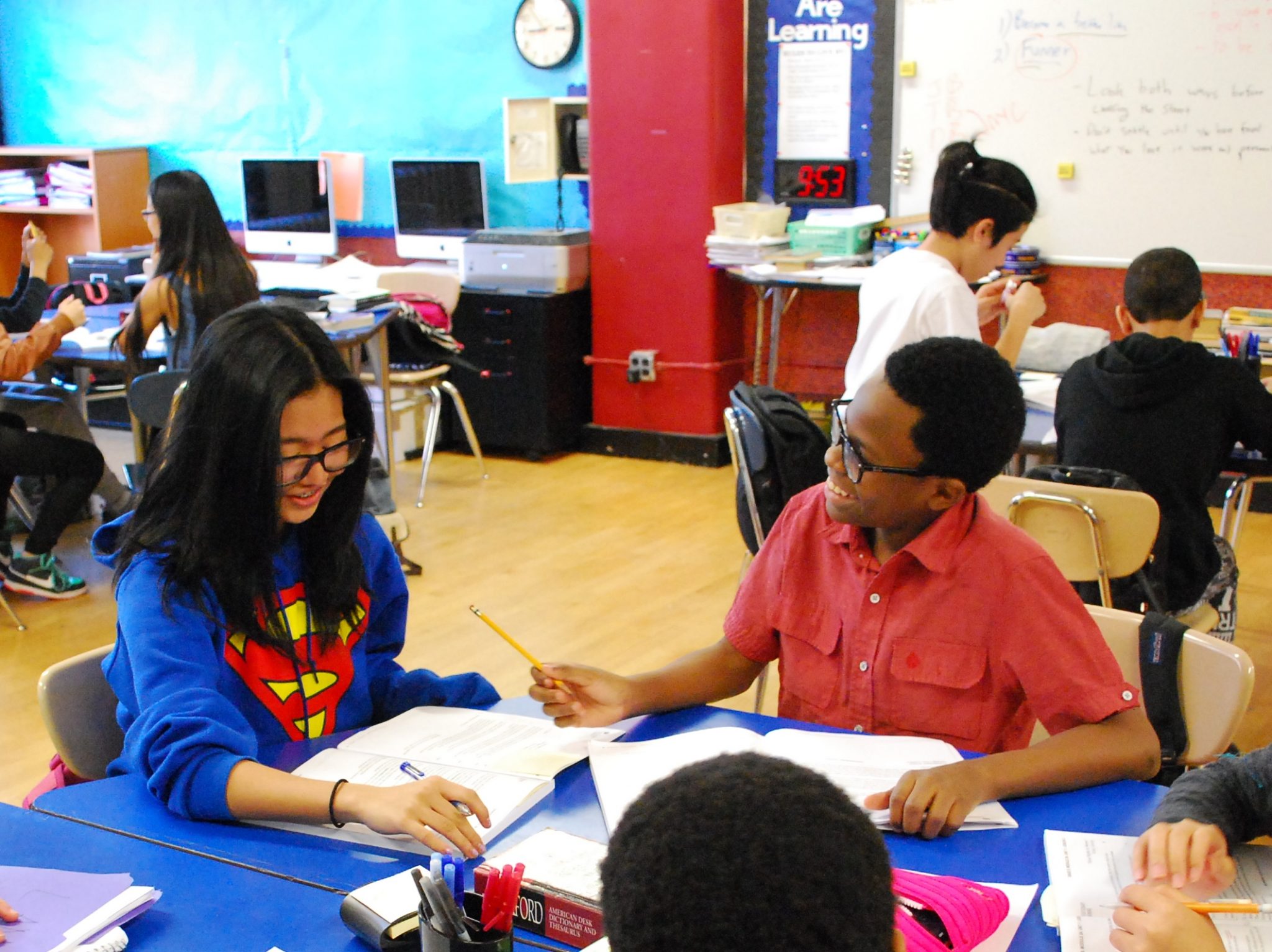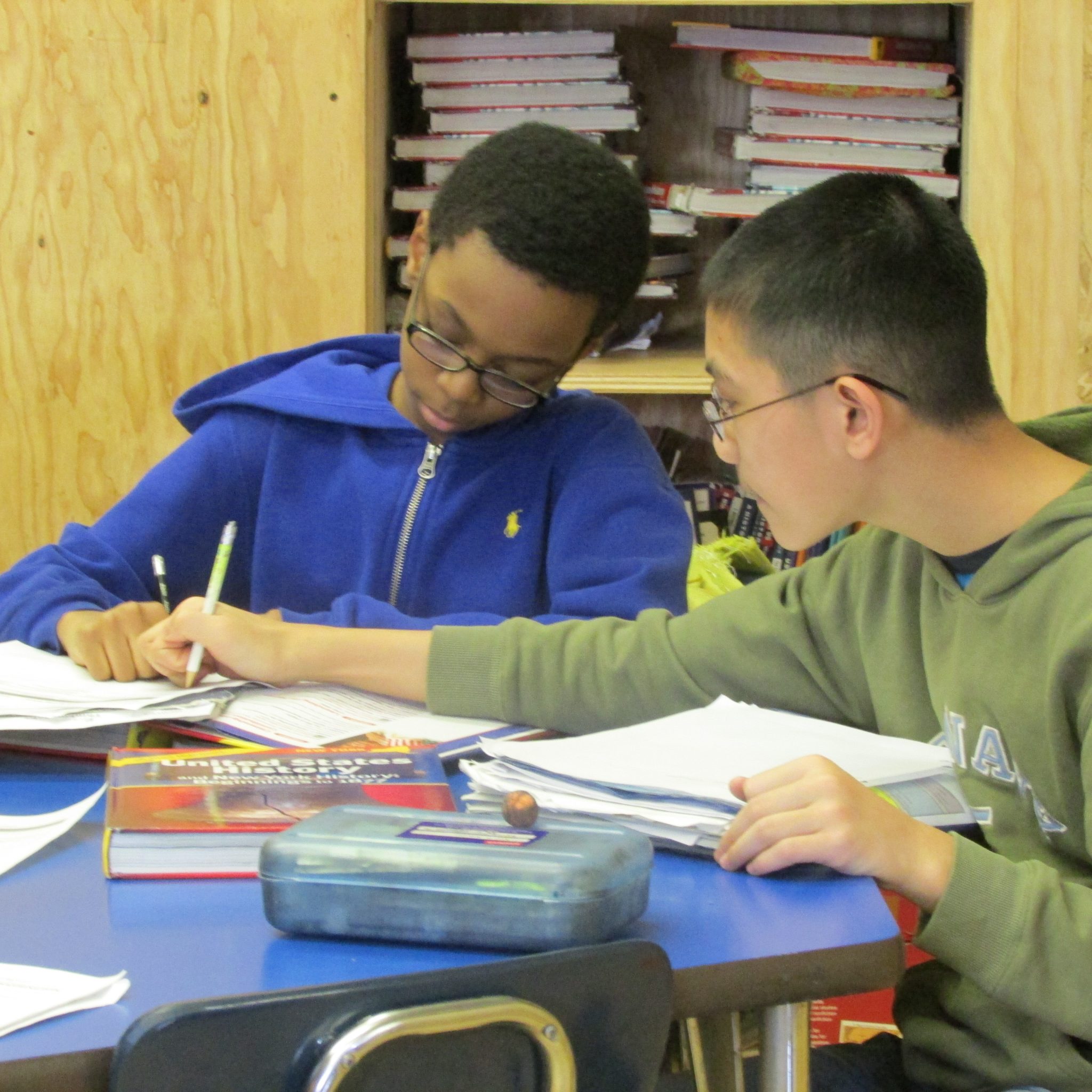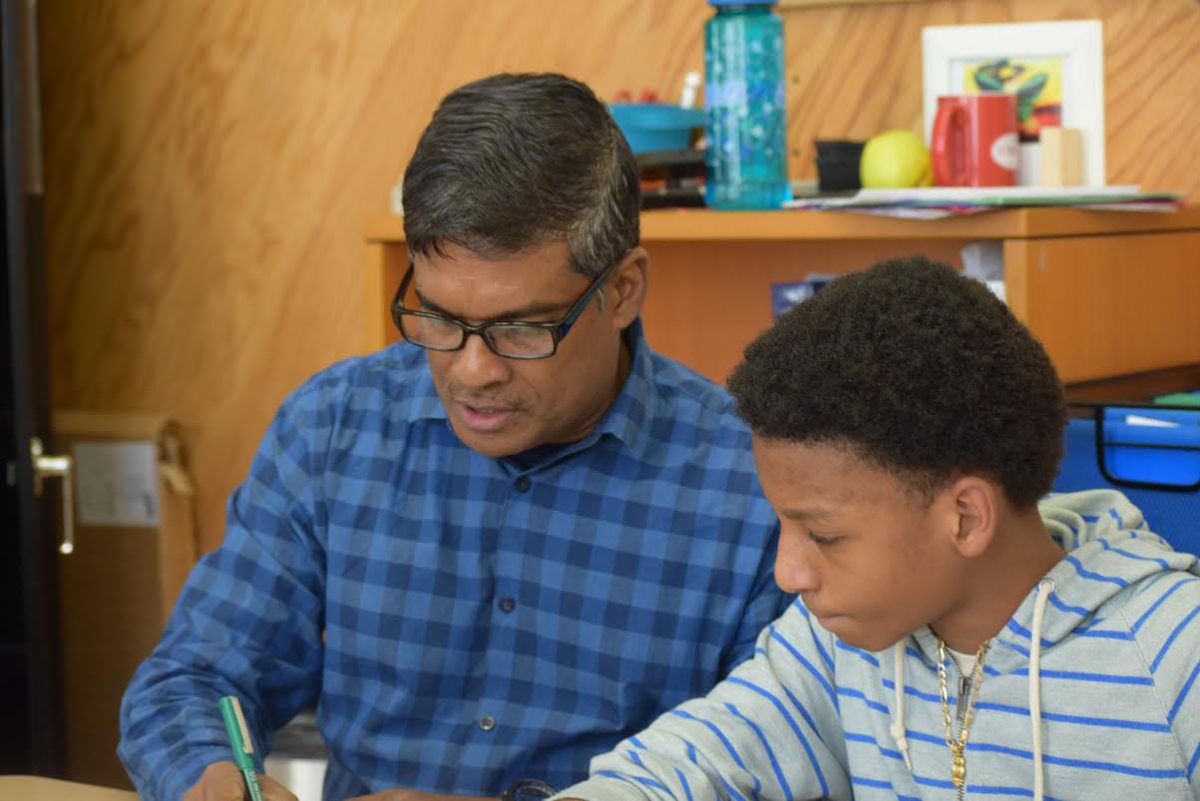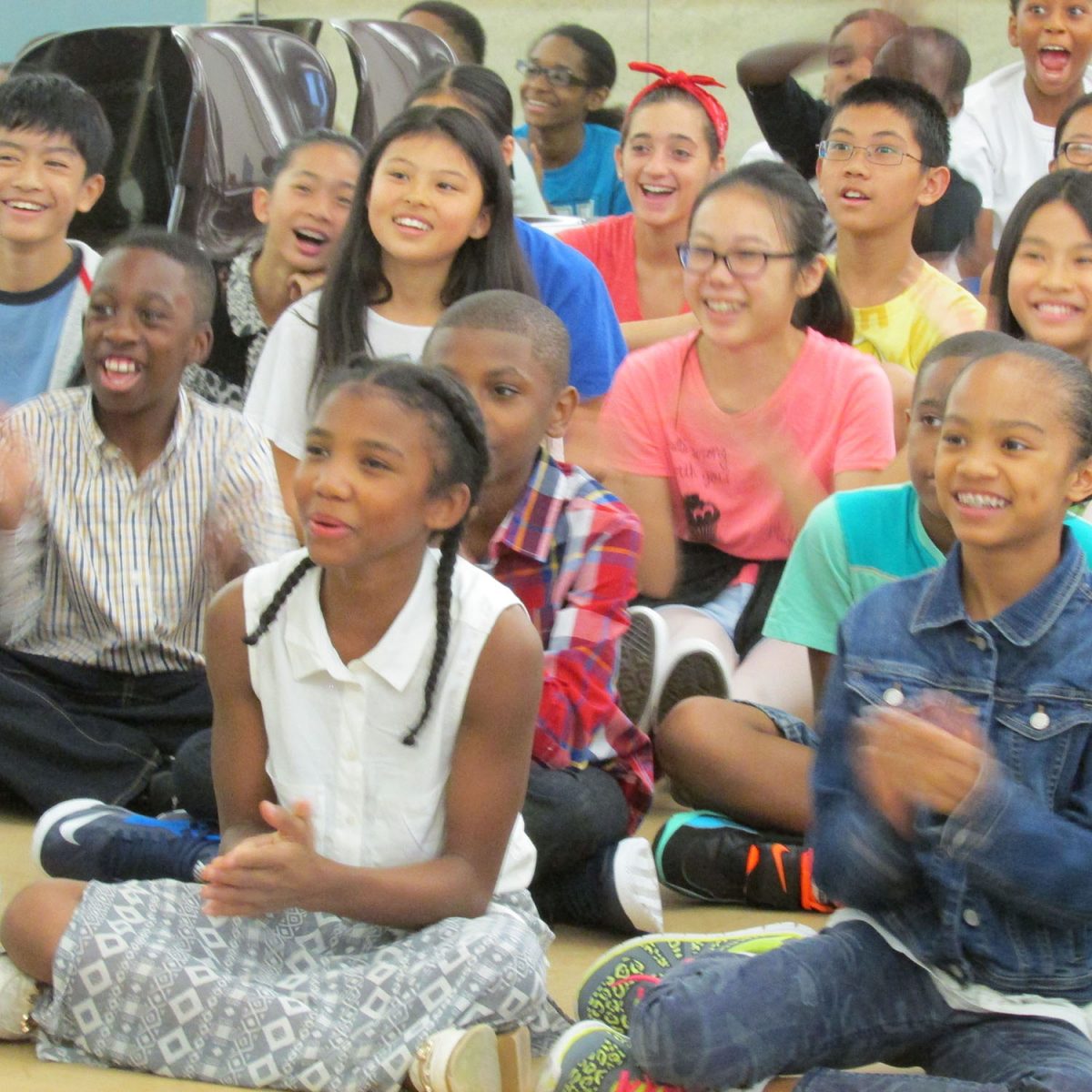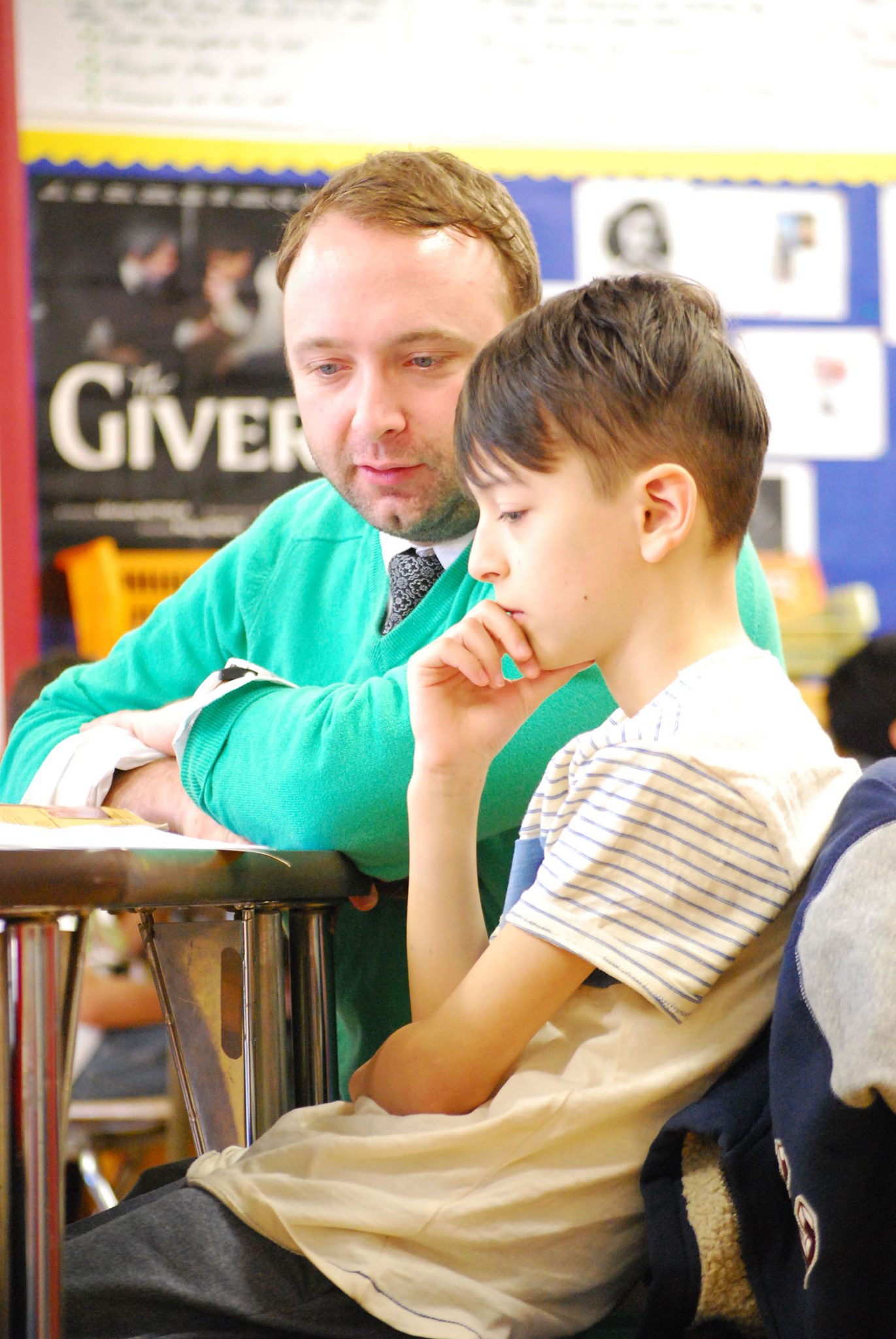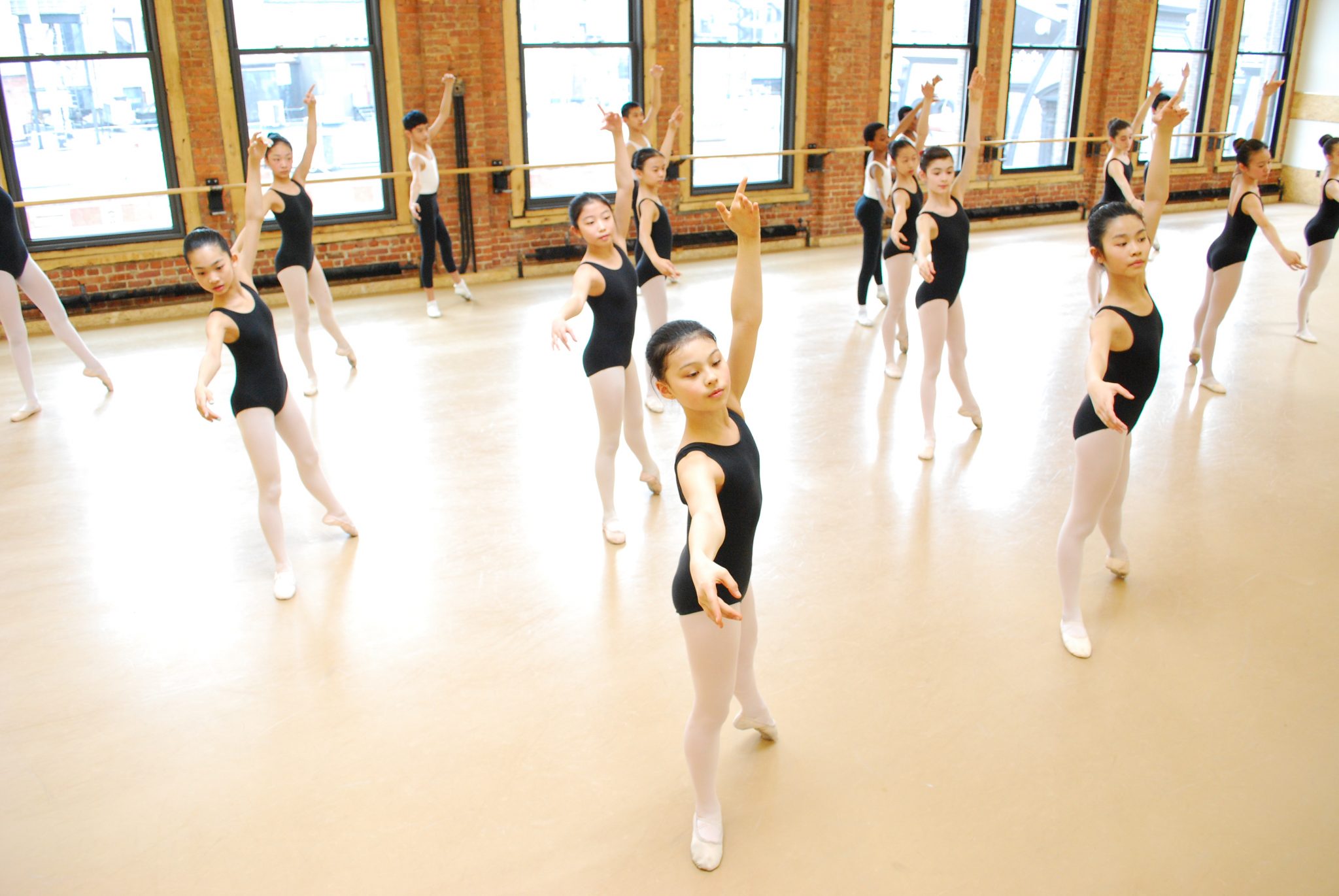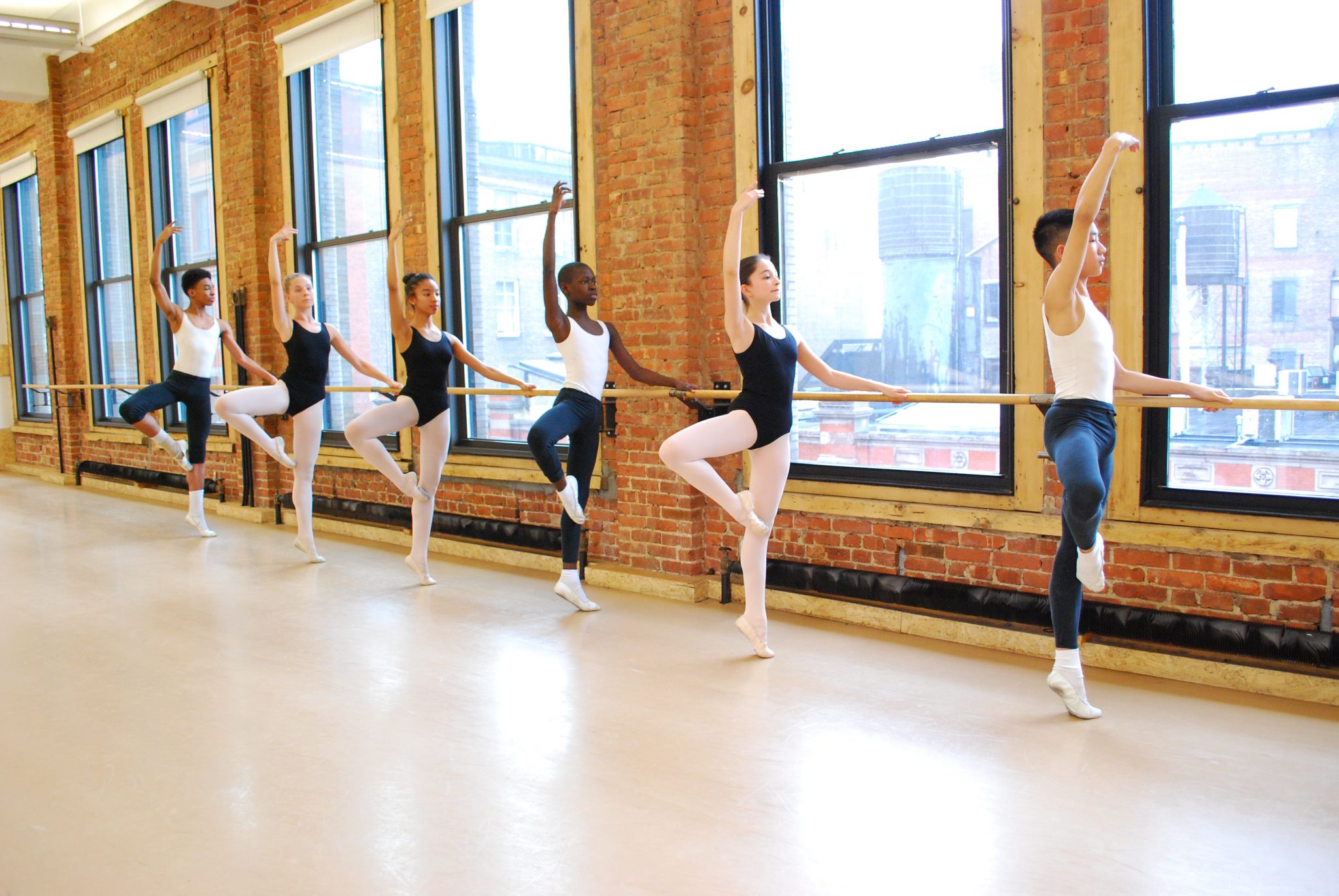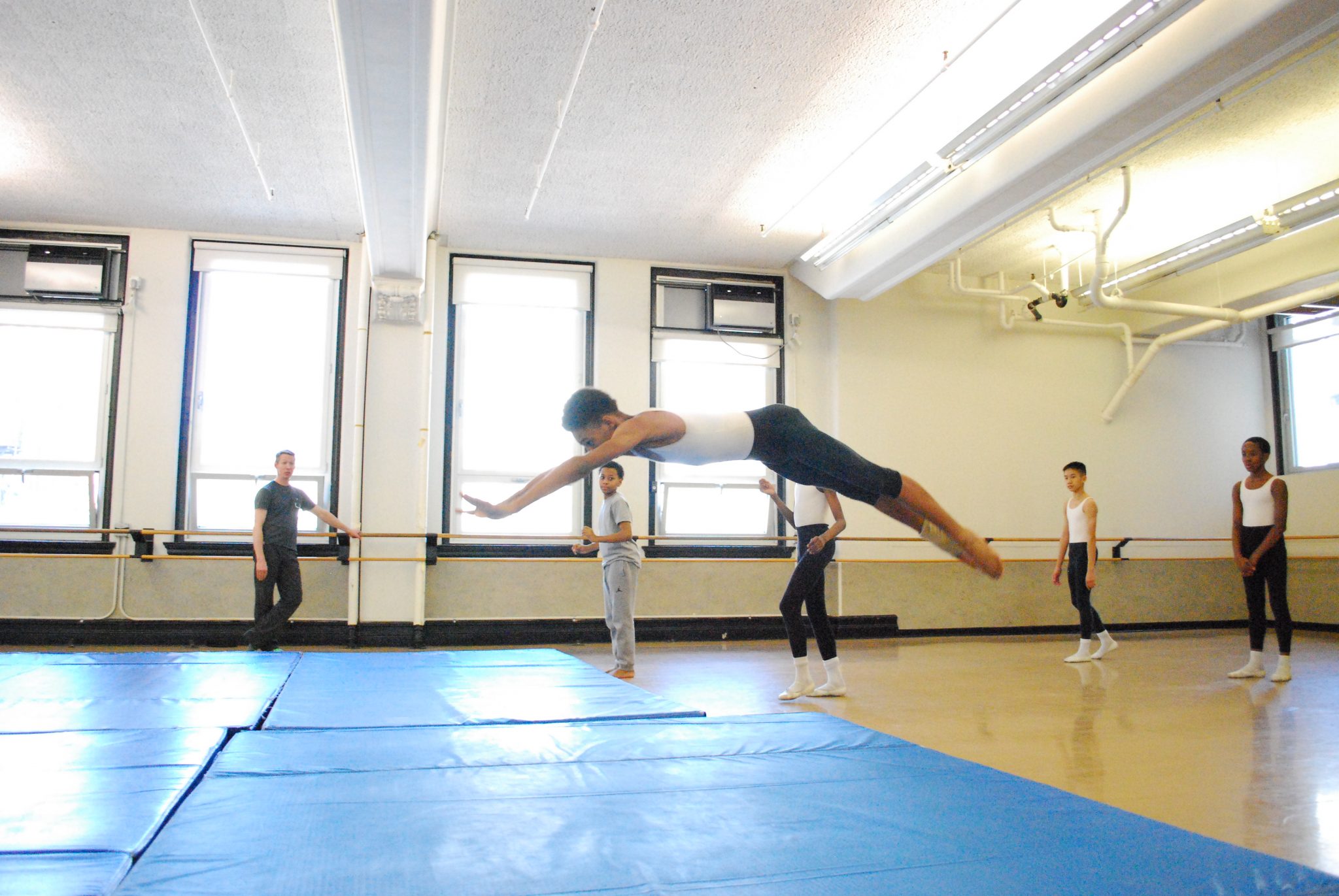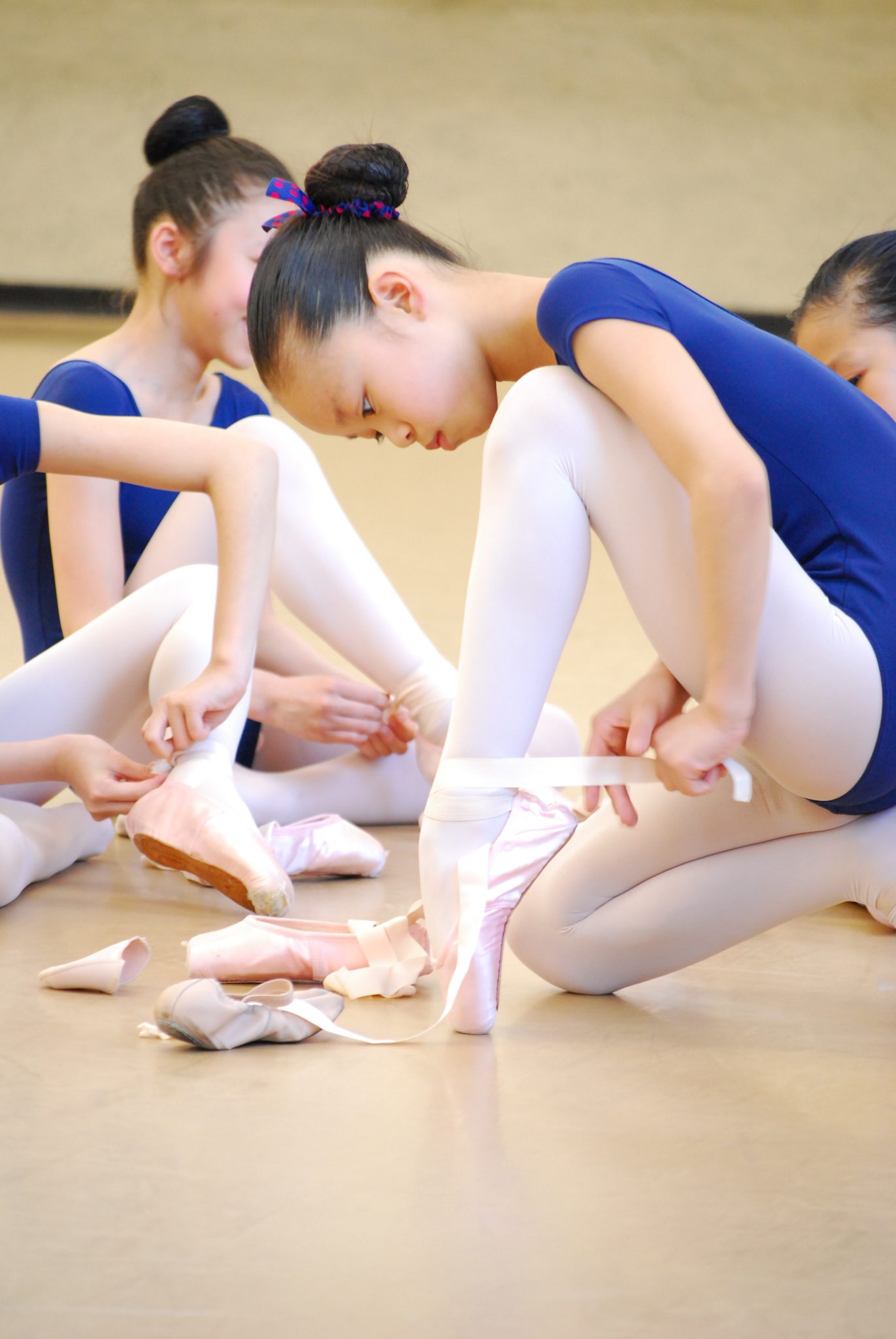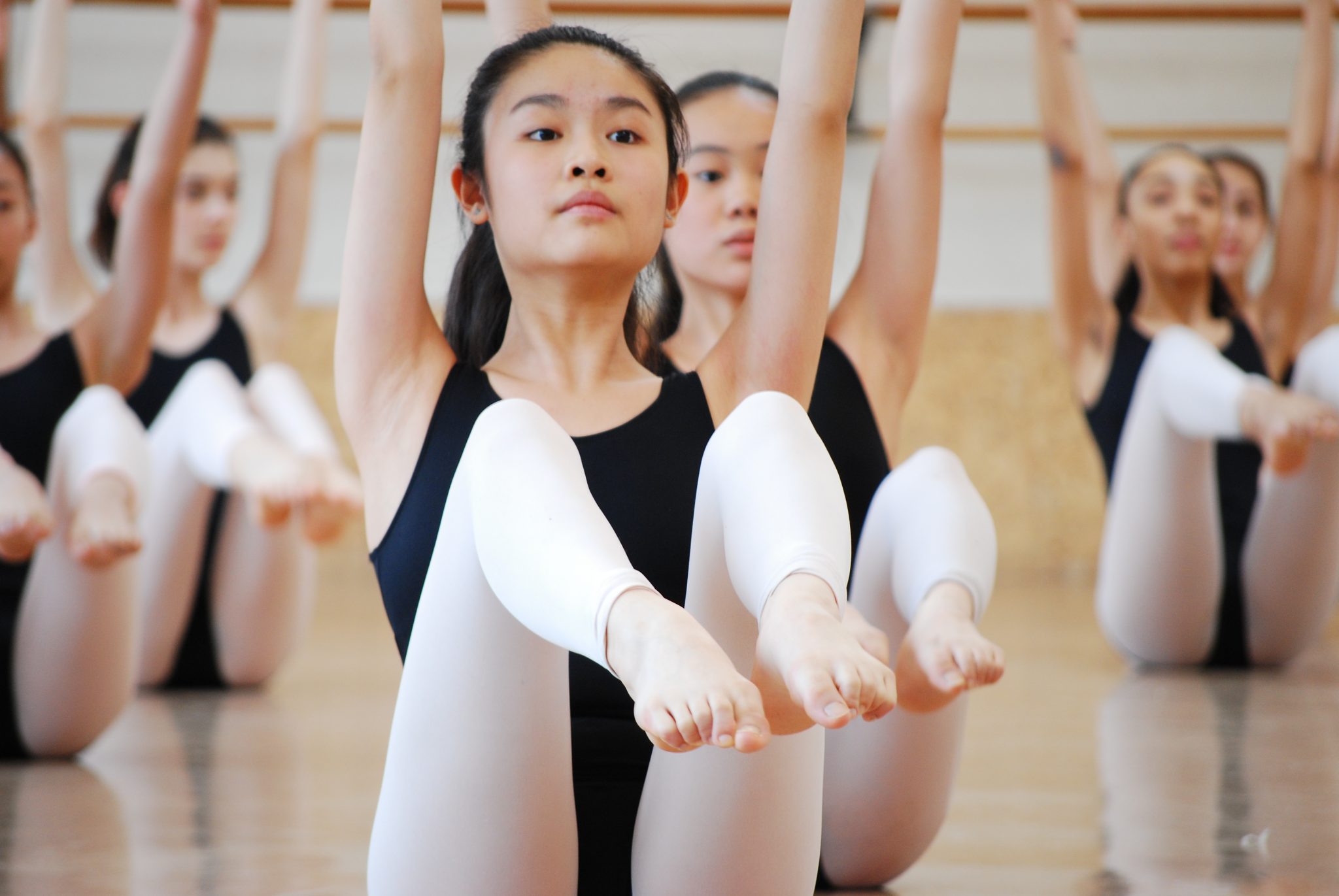The Academic Curriculum
Learning Philosophy
At Ballet Tech, we believe that children learn best in a supportive and positive environment that encourages discussion and requires critical thinking. For students to make progress and meet the demands of our high standards, in both academic and dance classes, teachers must know their students intellectually, socially, and emotionally, and support their growth from that position. While the content of subject matter varies from class to class, there is a common culture of learning based on strong work habits, collaboration, persistence and, perhaps most importantly, reflection.
Features of this common culture and learning philosophy are evident in all classrooms and include:
- Faculty and students collaborating respectfully to cultivate positive interactions that result in students feeling safe, valued, and comfortable taking intellectual risks.
- Students intellectually engaged in well-designed learning activities that require critical thinking.
- An understanding that while the work is challenging, students are capable of growing and learning if they are prepared to work hard and, if necessary, receive support from teachers prepared to meet the needs of all learners.
- Students participating in discussions to acquire and build knowledge and are challenged to support their ideas with specific text or other evidence.
- A variety of forms of feedback, from both teacher and peers, which enable students to self-assess and assume responsibility for the quality of their work.
- Students understand that learning is a process—one that requires the time and opportunity for them to revise their own thinking and make improvements to their work.
English Language Arts
Ballet Tech’s Middle School students build, deepen, and expand on the foundational skills taught in the Lower School—reading, writing, speaking, and listening. Students are given the opportunity to book shop weekly from a single class library of more than 1000+ books, spanning all genres and text types, allowing students the freedom to explore their unique literary interests. They are expected to understand and articulate, in writing, the main ideas of grade level texts and make connections between those texts, themselves, and the world in which they live. Students advance their speaking and listening skills by engaging in high-level discussion and debate with their classmates to fully address topics and issues arising from the texts explored in class. Some of the activities that help foster these habits include but are not limited to:
- Conducting close readings of novels, short stories, and poems to understand common literary themes and messages
- Explaining how authors use word choice, sentence structure, and other writers’ craft moves to convey ideas or render characters
- Learning how to identify and uncover the meaning of unfamiliar words using their knowledge of context clues, root words, affixes, and, if all else fails, good old-fashioned dictionaries
- Participating in partner, small group and whole class discussions by listening, asking questions, sharing ideas, and building on the ideas of others
- Engaging in writing cycles to produce essays and extended written responses that articulate claims supported by clear reasons and backed by carefully chosen evidence
- Exploring the writing process by participating in writer’s workshops to study and produce student-driven personal narratives, realistic fiction stories, companion books, literary essays and poems.
Our teachers use curricula developed by Expeditionary Learning to teach close reading skills that support our students as they read and analyze grade level texts. This program provides the necessary balance of fiction and non-fiction reading to meet the Common Core standards while engaging our young readers in meaningful texts. As well, teachers use Columbia University’s Teacher’s College Reading and Writing Program’s Units of Study in Writing to create lessons based on a writer’s workshop model. During these lessons, students analyze grade level mentor-texts, receive instruction on the craft of writing, and develop their writing skills during independent writing time. Students refine and revise their pieces as they confer with their peers and teacher to receive and implement meaningful feedback. Students’ published writing pieces are often celebrated during class publishing parties attended by other classes and parents.
Mathematics
Ballet Tech’s Middle School math students continue to develop the foundational skills established in the Lower School, while broadening their mathematical thinking and expanding their knowledge base. The middle school mathematics program emphasizes student-centered and collaborative exploration of real-life math application. This approach fosters a deep understanding of critical math concepts and skills. As well, students work independently and with partners and groups to not only problem-solve through reasoning, but to develop the ability to explain mathematical ideas. Some of the activities that students engage in to help further the mastery of these skills are:
- Making sense of complex word problems and solving them
- Reasoning abstractly and quantitatively
- Constructing viable arguments for mathematical solutions and critiquing the reasoning of others
- Modeling real world problems with mathematics
- Engaging in problem solving tasks that require the recognition and appropriate use of particular mathematic tools
- Attending to precision wen solving multi-step problems
- Looking for and making use of mathematical structures
- Looking for and expressing regularity in repeated reasoning.
Middle School math classes are driven by the Connected Mathematics 3 (CMP3) curriculum and pedagogy. While our curriculum follows CMP3’s units, which focuses on four strands – Numbers and Operations, Geometry, Data and Probability, and Algebra – it is also supplemented with additional resources from EngageNY. Students participating in the Algebra I course, aligned to the Common Core, partake in a faster paced series of units and lessons designed to prepare them for the Algebra I Common Core Regents Exam.
Social Studies
Ballet Tech’s Middle School Social Studies program is designed to extend and shape the critical thinking skills established in the 4th and 5th grades. Our Middle School students engage in a Social Studies program that is designed to not only help them make sense of the world in which they live, but to give them the context and the background information necessary to better understand the intricacies of history, historical figures, time periods, and the movement of peoples and cultures. Lessons are designed in such a way that they require students to think like historians, raise questions, think critically, consider many perspectives and gather information to draw conclusions. Some topics explored by our Middle School students are as follows:
- The Eastern Hemisphere: students explore how geography, economics, people and key events have impacted the peoples of Africa, the Middle East, South Asia, East Asia and Europe.
- United States History, 1607-1877: students explore the settlement of America through Reconstruction. Students focus on the movement and culture of peoples, the changing of politics and access to citizenship, the interaction of people with the environment, and the forms of production that distinguish the regions and types of communities throughout the United States.
- United States History, 1877-present: students explore the United States from Industrialization in the 1870s through the role of the United States in the global economy today. Students focus on the movement and culture of people, the changing of politics and access to citizenship, the interaction of people with the environment, the forms of production that distinguish the regions and types of communities throughout the United States.
Our students engage in a course of study based on the New York City Social Studies Scope and Sequence. In addition, our Science and English Language Arts classes are designed to support our students as they meet the Common Core Social Studies Literacy Standards. Students draw information from close readings of multiple digital or print sources and summarize text in order to make inferences and draw conclusions. Students often communicate their learning in variety of formats: oral presentations, written reports, essays, argument writing, and other applicable genres. Student presentations are showcased during school-wide events such as Open Class Week or First Friday assemblies.
Science
Children possess a natural curiosity that leads them to explore and question the world around them. Our Middle School science classes combine this natural curiosity with a rigorous, inquiry-based environment that provides a hands-on and minds-on approach to exploring and learning. Allowing our students the opportunity to acquire knowledge by actively engaging in the discovery process reinforces many positive learning habits as well as provides a richer learning experience. Students frequently work in pairs and small groups, making connections between what they already know and the scientific principles that guide and govern our world. Through this work students develop and strengthen the following science related skills:
- Applying appropriate skills learned in the lower school to relevant tasks through: classifying, comparing and contrasting, creating models, gathering and organizing data, observing, and predicting
- Building base knowledge of the natural and physical world
- Communicating – giving oral explanations, written descriptions, and graphic representations of observations
- Developing and using their own models to interpret natural phenomenon
- Using mathematics and computational thinking to solve science problems
- Planning and carrying out their own investigations
- Engaging in argument and debate, using evidence to defend scientific positions
- Honing the skills of observing, hypothesizing, experimenting, analyzing data, and communicating results from smaller class projects to meet long term student-generated goals, culminating in an end-of-year project.
Our students engage in a course of study based on the New York City Science Scope and Sequence. As well, our science curriculum is supplemented with resources and materials from Urban Advantage, a unique middle school partnership of well-known science institutions throughout the five boroughs. In addition, our science classes are designed to support our students as they meet the Common Core Science Literacy Standards. Students draw information from close readings of multiple digital and print sources. They summarize these texts in order to make inferences and draw conclusions. Student presentations created in science class are often showcased during school-wide events such as Open Class Week and First Friday assemblies.
Spanish
Ballet Tech is committed to providing students with a robust and well-rounded learning experience, one that includes learning a foreign language. Studies show that early exposure to foreign languages produces long-term cognitive and academic benefits. Adolescents in particular have a unique ability to absorb language and learn pronunciation. Ballet Tech utilizes that innate ability and gives students a wide variety of activities and teaching methods to keep them interested in learning Spanish. While this course only meets once a week, specific and solid teaching techniques are implemented to turn basic language activities into rigorous lessons in grammar, communication, and vocabulary.
Visual Art
Ballet Tech’s Visual Arts program is deeply committed to both the artistic and academic development of each student.
In the Middle School, the art program engages students in a multi-age learning and teaching model. Older students continue to work with a variety of materials and techniques as well as develop teaching and speaking skills by presenting their work to younger students.
At the end of each year, there is an annual Student Art Exhibit which celebrates the artistic achievement and collaborations of all students in the school.
There is great enthusiasm for all arts at Ballet Tech, a school founded on the belief that the arts play an integral role in the development of the child’s mind, body, and creative spirit.
The Dance Curriculum
Curriculum
Students in Ballet Tech’s Middle School dance 5 days a week, Monday through Friday. Dance classes are incorporated into the regular school day, but often extend past the end of the academic school day.
In addition to classes in Ballet Technique, Middle School students take classes in Allegro, Audition Prep, Conditioning, Feld Repertory, Horton, Jazz, Partnering, Pilates, Pointe, Repertory / Improv, and Tap.
In their ballet classes, Middle School students:
- Retain form, proper placement and alignment while doing more challenging combinations
- Continue to experience the flow of a ballet class, with more challenging barre and center work, and traveling combinations across the floor
- Learn and retain intermediate ballet vocabulary
- Continue to incorporate the use of épaulement (the relationship of the head and shoulders to the feet)
- Learn how to reverse all combinations
- Strengthen feet and legs for more advanced jumps and pointe work
- Deepen their connections to the relationship between music and movement
6th Grade
Weekly Classes:
5 Ballet Technique classes
2 Allegro or Pointe classes
2 Conditioning classes
1 Horton class
1 Jazz class
1 Tap class
7th Grade
Weekly Classes:
5 Ballet Technique classes
2 Allegro or Pointe classes
2 Conditioning classes
1 Audition Prep class (elective)
1 Feld Repertory class
1 Horton class
1 Partnering or Variations class
1 Study Hall class (elective)
8th Grade
Weekly Classes:
4 Ballet Technique classes
2 Allegro or Pointe classes
1 Audition Prep class (elective)
2 Conditioning classes
1 Feld Repertory class
1 Horton class
1 Partnering or Variations class
1 Study Hall class (elective)
1 Tap class
Middle School students also participate in Kids Dance, Ballet Tech’s annual season at The Joyce Theater. Rehearsals for Kids Dance typically start in January.
The Summer Session
Each summer, Ballet Tech Foundation offers its incoming and continuing students a 4-week summer dance program. Participation in the Summer Session is recommended, but not required.
In addition to their regular dance classes, students take classes that are not offered during the academic school year.
The 2023 Summer Session is scheduled for July 10 – August 4. The summer class schedule and registration forms will be distributed to families in late Winter 2023.
Facilities
Ballet Tech’s facilities include five dance studios. The studios have marley-covered, sprung-wood floors, mirrored walls, and 13 foot ceilings.

